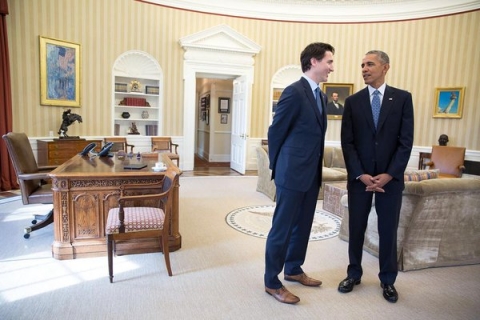Mar112016
Posted at 10:23 AM
Post by Penny Pritzker
This week, President Obama hosted Canadian Prime Minister Justin Trudeau on his first state visit to America. Our neighbor to the north is one of the United States’ most important partners across a range of issues, including security, energy, and climate change.
With $2 billion in goods and services moving across our shared border every day, the significance of our economic relationship cannot be overstated. Canada is the largest export market in the world for the United States and our second largest source of imports. In fact, Canada buys more goods from the United States than the entire European Union.
Since implementation of the North American Free Trade Agreement more than 20 years ago, U.S.-Canada two-way trade has nearly tripled. Together, the United States and Canada generated $575.5 in merchandise trade last year. Trade in services, another critical component of the U.S.-Canada trade relationship, totaled more than $91.5 billion in 2014.
Additionally, Canadian companies like PEDS legwear and TD Bank employ Americans from North Carolina to Michigan. With more than $311 billion in stock, Canada is one of our largest sources of foreign direct investment.
In short, the U.S.-Canada bilateral economic relationship is the most efficient, most integrated, and most dynamic in the world.
At the Department of Commerce, we are working closely with our counterparts in Canada through a number of avenues to facilitate even more trade across our borders, while also promoting security.
First, the Beyond the Border Initiative has provided tangible benefits to residents, travelers, and industry in both countries in the areas of perimeter security as well as trade and travel facilitation. Over 300,000 visitors travel between our countries daily for business or leisure by every mode of transport.
Last week, as part of the Beyond the Border Action Plan, the Department of Homeland Security launched the Known Employer pilot. The trial program allows U.S. employers to be pre-screened and approved by the U.S. Citizenship and Immigrations Services for eligibility to sponsor individuals through employment-based visa categories. The employer can then apply to hire a worker under certain immigrant and nonimmigrant visa programs without having to resubmit company information with each petition or application.
The pilot process, which is scheduled to last for up to one year, will include up to nine organizations from across a variety of industries. Initial companies participating include Citigroup, Inc., Ernst & Young LLP, Kiewit Corporation, Schaeffler Group USA, Inc., and Siemens Corporation.
We also recently signed a Preclearance Agreement that will expand expedited customs inspections of travelers entering the United States and Canada by land, rail, and sea. Preclearance already exists in the air mode of travel. This will reduce congestion and delays at the border and increase efficiency and predictability in cross-border travel, tourism, and transportation.
In addition, the U.S –Canada Regulatory Cooperation Council (RCC) facilitates the coordination of our regulatory policies. While our regulations are already closely aligned, the RCC is working hard to deepen and broaden our cooperation on both new and existing regulations. Eliminating unnecessary barriers to trade reduces costs for companies and consumers alike.
We are working together with industry, our regulators, other interagency colleagues, and the Canadian government to reduce growing regulatory barriers to our automotive products. We are focused on ensuring that vehicles made to North American standards will be accepted in markets around the world. This will benefit both the Canadian and U.S. auto industry moving forward.
The United States and Canada share a unique and special friendship. Deepening the ties between the United States and Canada will enhance the free flow of people and goods, build a brighter future for communities across our continent, and strengthen the competitiveness of our economies and the North American commercial platform.



